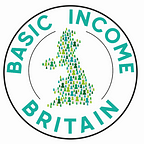We need universal income, not universal credit
Universal credit has proven to be the problem, not the solution
The OECD recently suggested universal credit was more effective than basic income. After the Finnish government announced they would not be expanding their two year cash handout trial for the unemployed, the think-tank recommend a UK-style universal credit system as a better option for reducing poverty and welfare complexities.
Despite Ian Duncan Smith’s ambitious overhaul being passed in 2011, universal credit is still in it’s early stages. IT blunders, management cover-ups and general politics delayed the former Department of Work and Pensions (DWP) Secretary’s flagship program by five years. To date, universal credit is only rolled out in a handful of areas. Hiccups aside, the DWP aims to expand the £63 billion program to seven million Brits by 2022–23.
With six benefits being replaced and merged into a monthly payment, parallels have been drawn to universal income. The two are discussed as modernising solutions to dated welfare models.
As a basic income advocate, it is regrettable to see Finland abandon their trial. But as a Brit, seeing the disastrous consequences of universal credit at home, it is more regrettable that universal credit is recommended as a better alternative.
The title is misleading, universal credit is not universal. While basic income grants each citizen a share in the economy, universal credit will cover less than 10% of the population in the next five years. Far from being a universal amount, the credit each individual will receive will vary due to circumstance.
Without an agreed credit that each claimant will receive monthly, reports of ‘yo yo payments’ have emerged. To many seeing their credit wildly fluctuating, budgeting has become near impossible.
To make matters worse, universal credit is not always paid to individuals. If you and your partner are both claiming, your credit will be merged and paid into a single account. If one partner is not abiding to conditions, both suffer sanctions. Wider than budgeting, this is clearly problematic to someone with little say in their marriage, going through a break- up or in an abusive relationship.
Under basic income, money is distributed to each individual. To merge payments is recognised as illiberal and unnecessarily bureaucratic.
Unnecessary bureaucracy is a universal credit theme, however. Rolling six benefits into a monthly allowance has not diminished hurdles to welfare. Following a lengthy application form, eligible recipients constantly must prove their income, have recorded regular job center visits and/or continually demonstrate they are unfit to work.
With unconditional income, bureaucracy would be at a minimum. No tiers of administrators judging eligibility, tracking behaviour and ensuring ‘conditions’ are obeyed. People are trusted to do what they want with their money, not what they ‘ought’ to be doing.
The problem with conditionality and means testing is penalties. The biggest academic study on benefit sanctions in the UK revealed they were ineffective. Not only this, they were found to be deeply damaging to those in poverty, with next to no positives.
Disastrously, penalties apply under universal credit. These penalties are not lenient. Those found ‘fit to work’ or not attending job centre meetings face sanctions, either having their benefits reduced or removed totally. Research from the Glasgow University estimates one million people in low-paid work will be exposed to benefit sanction when universal credit is fully implemented. Currently, 350,000 people face sanctions each year.
Toying with someone’s ability to cover rent and feed themselves serves as more than a tap on the wrist, it’s no wonder foodbank use has soared since the roll out of universal credit.
Universal income is so appealing because there are no conditions and penalties, particularly with no evidence that either work. By removing the paternalistic nature of the welfare state, anyone can seek their own kind of work without their livelihood being threatened by the DWP. This way, work will always be incentivised without the safety net being diminished.
Frustratingly, less can be said about universal credit. There is increasing evidence it is even failing at making work pay. With complications entrenched in the system, universal credit will most probably exacerbate the ballooning number of working people in poverty, already a staggering 3.8 million people.
Before prescribing to other countries, the OECD should look carefully at what is unfolding in the UK. Universal credit has proven to be the problem, not the solution. With few work incentives, strenuous bureaucracy and false title, the basic income movement in Britain has a clear policy opposition.
Luke Brett, Editor of Basic Income Britain.
